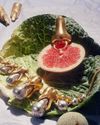For years, no chef dared try to improve the croissant. Now, though, a new generation of bakers is reinventing the most iconic of French patisserie.

THE CROISSANTS OF Baker Doe — a delivery-only pastry service in San Francisco, run by a husband and wife who decline to reveal their identities — appear like a new species startled in the wild. One is striped blue, with a coif of cotton candy in hydrangea hues and a lode of chile-enflamed orange curd waiting to be unleashed; another, ringed in deep purple, flaunts a lavender shard of ube (purple yam) like a lone, useless wing. They are originals, yet they don’t exist in isolation: Others of their kin — that is, pastries in thrillingly deviant forms with classical French lineage but non-canonical ingredients (often drawn from Asian cuisines), as likely to be savory as sweet — can be spotted at Sugarbloom Bakery in Los Angeles, confettied in nori; at Bake Code in Toronto, blackened by charcoal under a rosy crust of mentaiko (cod roe); and at Supermoon Bakehouse in New York, piped with rum crème pâtissière and pineapple jelly in a mirage of a piña colada.
Is this blasphemy or natural evolution? It’s not the first time pastries have undergone mutations in recent history. Nearly five years ago, the French-trained pastry chef Dominique Ansel trademarked the cronut, that cannily named croissant-doughnut hybrid sold from his storefront in SoHo, New York. Hoards lined up before dawn for limited-batch runs that vanished within the hour, to be resold on the black market by scalpers at a 1,900-per cent markup (as much as $100 each). The cronut was fetishised, then scorned for being fetishised, then imperfectly and ubiquitously reproduced. Dunkin’ Donuts sold millions (of a version that a corporate spokesman insisted had been in development for decades). Within a year, the oracular science-fiction writer William Gibson had published a novel forecasting a future in which cronuts were churned out by 3-D printers.
هذه القصة مأخوذة من طبعة June 2018 من T Singapore: The New York Times Style Magazine.
ابدأ النسخة التجريبية المجانية من Magzter GOLD لمدة 7 أيام للوصول إلى آلاف القصص المتميزة المنسقة وأكثر من 9,000 مجلة وصحيفة.
بالفعل مشترك ? تسجيل الدخول
هذه القصة مأخوذة من طبعة June 2018 من T Singapore: The New York Times Style Magazine.
ابدأ النسخة التجريبية المجانية من Magzter GOLD لمدة 7 أيام للوصول إلى آلاف القصص المتميزة المنسقة وأكثر من 9,000 مجلة وصحيفة.
بالفعل مشترك? تسجيل الدخول

Look At Us
As public memorials face a public reckoning, there’s still too little thought paid to how women are represented — as bodies and as selves.

Two New Jewellery Collections Find Their Inspiration In The Human Anatomy
Two new jewellery collections find their inspiration in the human anatomy.

She For She
We speak to three women in Singapore who are trying to improve the lives of women — and all other gender identities — through their work.
Over The Rainbow
How the bright colours and lively prints created by illustrator Donald Robertson brought the latest Weekend Max Mara Flutterflies capsule collection to life.

What Is Love?
The artist Hank Willis Thomas discusses his partnership with the Japanese fashion label Sacai and the idea of fashion in the context of the art world.

The Luxury Hotel For New Mums
Singapore’s first luxury confinement facility, Kai Suites, aims to provide much more than plush beds and 24-hour infant care: It wants to help mothers with their mental and emotional wellbeing as well.

Who Gets To Eat?
As recent food movements have focused on buying local or organic, a deeper and different conversation is happening among America’s food activists: one that demands not just better meals for everyone but a dismantling of the structures that have failed to nourish us all along.

Reimagining The Future Of Fashion
What do women want from their clothes and accessories, and does luxury still have a place in this post-pandemic era? The iconic designer Alber Elbaz thinks he has the answers with his new label, AZ Factory.

A Holiday At Home
Once seen as the less exciting alternative to an exotic destination holiday, the staycation takes on new importance.
All Dressed Up, Nowhere To Go
Chinese supermodel He Sui talks about the unseen pressures of being an international star, being a trailblazer for East Asian models in the fashion world, and why, at the end of the day, she is content with being known as just a regular girl from Wenzhou.